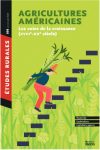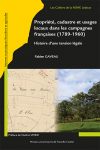Accueil
ERHIMOR a été créée avec l’intention clairement affichée de développer sur des bases nouvelles les travaux qui intéressent l’histoire de l’agriculture et l’histoire du monde rural et de renouveler les recherches engagées depuis de nombreuses années sur l’histoire de la famille. Il s’agit de considérer ces questions comme des clés d’interprétation des sociétés contemporaines et de promouvoir une large ouverture internationale.
Les rapports de la campagne à la ville et aux marchés, l’évolution des droits de propriété et leur incidence sociale, économique, environnementale, les processus de croissance et les transformations liées aux spécialisations ou aux mécanismes d’intensification, la construction des liens sociaux et la mesure des inégalités sociales, les politiques d’encouragement à l’agriculture impulsées par les Etats constituent le premier axe de recherches d’ERHIMOR. Les mécanismes de la reproduction sociale étudiés sous l’angle de la transmission, des rapports à la terre, des cycles de vie et des phénomènes migratoires représentent le second.
ERHIMOR est issue de la fusion de deux groupes du CRH, dont les orientations scientifiques étaient dirigées vers une histoire des campagnes : le GRHEC (Groupe de Recherches pour l’Histoire des Campagnes) et le Groupe Histoire Familiale et Sociale de la Transmission, coordonnés respectivement par Gérard Béaur (CNRS & EHESS) et Joseph Goy (EHESS).
ACTUALITÉS
Soutenances
Laurent Herment a soutenu, le 25 mai 2021, son Habilitation à diriger des recherches, dirigé par devant un jury composé de Judith Rainhorn, garante (Paris 1 Panthéon-Sorbonne), Florence Hachez-Leroy (Université d’Artois CRH-EHESS) , Christophe Bonneuil (CNRS), rapporteur , Leen van Molle (KU Leuven) rapporteur, Alain Chatriot (SciencesPo) et Gérard Béaur (CNRS-EHESS)
Dernières Parutions

Dossier: La historia rural europea, evoluciones recientes – Sous la direction de Pablo F. Luna





